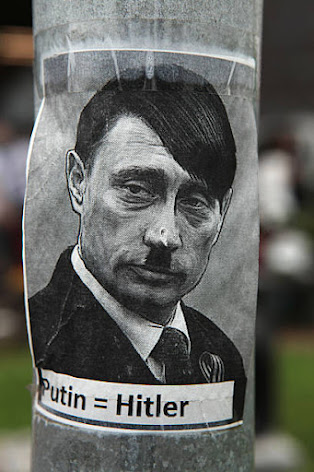Putin is the new Hitler, and both of their intentions are not bad to stop expanding NATO forces and alleviate the threat to their national security. However, this could have been done through diplomatic channels, not through conventional war. What will Putin do if no diplomats listen to him? He wanted Ukraine not to join NATO, but nobody listened to him. So, if you look from Putin's perspective, he is doing the right thing to save his people from the NATO forces.
West cannot help Ukraine win this war. Russia may win this war, but the Ukrainians will never surrender to Russian aristocrat Putin. Even some of them might surrender; time cannot go back as we live in the age of information, and this will have dire consequences for Putin himself later.
Putin is getting older, and in a few years, he will die. But, before his death, he wants to conquer the world and re-build the "Russian Empire." He is not stupid, but it is good to remember that having a large portion of land does not mean you own the entire Earth. Genghis khan tried to do the same but look now how much land Mongolia has compared to during his era.
The war causes great devastation not just to ordinary people but also to mother earth. Read, for example, "war crimes" havoc related to the environment and climate change. But who cares when people die, buildings are destroyed by missiles, and bullets are firing every second.
Like German philosopher George Hegel famously said, "The only thing that we learn from history is that we learn nothing from history". Long before Putin, Aristocrats, Kings and Great Rulers such as Hitler, Genghis Khan, and others all come and go because the time will never stop. No one can stop the clock because it does not care about the world's rulers. Time also does not care about world politics or the world's geopolitics. The Earth does not stop rotating within a limited span of human life. As long as our Earth turns, we will all die at some point.
The war in Ukraine will not stop until Ukraine either loses Kyiv or the Russian military is withdrawn by Putin's order, which will not happen because it is not the nature of aristocrats to reverse their decisions. Any western sanctions, isolation, or hindrance will not hamper Putin's ambition. He is just like me no regard for the rule of law and no aspiration to back down once committed.
Like the fall of Hitler when he waged war on two fronts, both in Britain and Soviet Russia, Putin will have to face dire consequences if he stages multiple battles on many Eastern and Ukraine fronts. So, Putin will not do that immediately even though NATO is boosting its military presence on its eastern flank.
Only aristocrats listen to other aristocrats, so China's role is vital in this conflict. President Xi can ask Putin to stop this war, but he will not do so because he has solid ties on many fronts with Putin. They have already agreed on this before waging war. So China does not care if Putin occupies Ukraine as long as Chinese studying in Ukraine is not hampered. A similar story is with India since both countries have "abstained" from the UN security council resolution.
The mask is off our faces, and now nobody is talking about "Pandemic" or the "Coronavirus" any longer. We are all carefully looking and seeing what other fellow human beings in Ukraine are going through in these challenging times. Even when said to Putin by the UN security general, "In the name of humanity, please stop this war". Putin does not care about "humanity". Humanity to him means Russian people and the great Russian empire only.
I know very few, or nobody, will read this blog or post. Surely nobody from the Russian empire as there are millions of posts, tweets, and information floating around the Internet. However, from what I am seeing and felt over the past few days and weeks, Russia might go nuclear, but this is also hard to sell to the Russian people because it has opposite consequences. Like Gandhi said, "eye to eye makes the whole world blind". So Russia throwing nuclear weapons over any country will also receive the same from another country, so "humanity" will collapse.
So, who going to stop Putin? It is Putin himself and nobody else.
#stopthewar #putin #ukraine #ww3 #eu #nato







